What is in store for the next round of BBC Radio cuts?
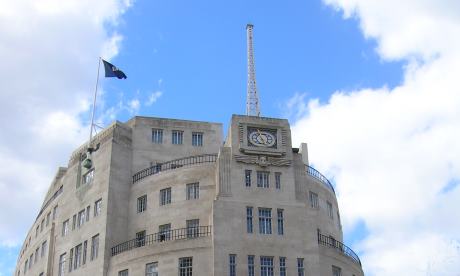
Following on from What is in store for the next round of BBC cuts?, let look at the options for radio in a little more detail.
Not an option: Salami slicing
One option, of course, would be to take 22% away from all services, but the BBC is set on the idea of keeping those things it thinks are "the best quality". It is worth noting that the BBC has made annual savings of between 4% and 5% every year since 1998.
Option 1: Merge Radio 3 and Radio 4
This could make a lot of sense if you wanted to cut 22% from the whole budget. Radio 4 has a large budget £122m, but a large number of listeners. Radio 3, on the other hand costs 44% of the speech station, but cost four times a much per listener-hour.
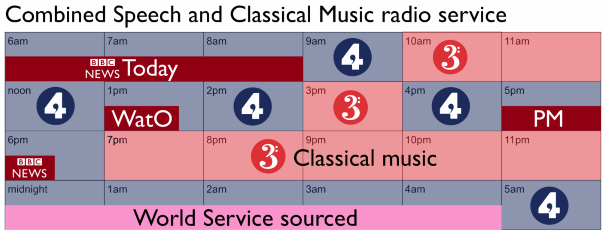
A combined service, with Classical Music hours at 10am-noon, an hour at 3pm and from 7pm-midnight would cut the cost of the service back to meet the cost cutting requirements. Taking 8 hours a day from Radio 4 would also allow the service to be made for less money, in particular expensive drama.
The BBC would no longer need the Radio 3 FM transmitter network.
Option 2: Merge Radio 5 Live and BBC England Local Radio
Another way of making savings of the scale required would be to change the network of local radio stations to use BBC Radio 5 Live as their main feed.
Aside from the breakfast (6am-9am) and "drive time" (4pm-6pm) shows, the local radio stations would relay the national news and sport network, but with periodic inserts of local news headlines and weather.
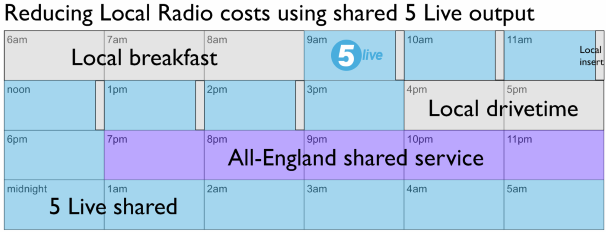
Using modern automatic branding (as the commercial local radio networks do) could allow the stations to be called, say "BBC Radio 5 Leeds" with local voices for the continuity.
Option 3: Close the World Service?
The BBC probably would be £250m a year better off if the (radio) World Service stations were closed. This would make the total annual cutbacks £500m, rather than £750, so radio would still need to save £24 million (15%) a year.
In effect, the multitude of World Service radio stations costs about the same as two Radio 4 stations, and closing these is outside the scope of the proposals.
Probably going to happen: goodbye Long and medium wave
Radio 4 Long Wave can easily be got rid of by putting the Parliament and Service shows onto 4 Extra.
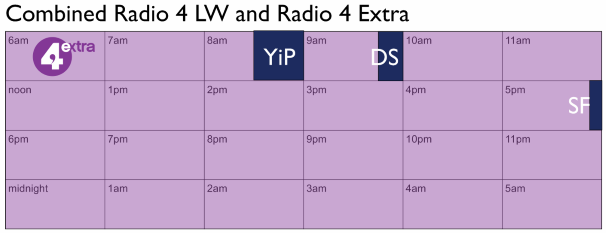
BBC Local Radio stations will close their Medium Wave service in most instances.
Merge other services?
Whilst 1Xtra is an excellent radio station, it is hard to see it not being merged with Radio 1. Perhaps on a 6pm-6am half-day "takeover" basis. This would save money as 1Xtra is cheaper than Radio 1.
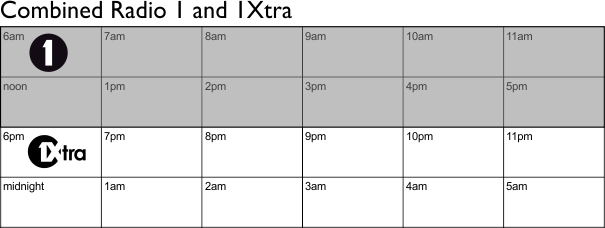
The double-national services in Scotland and Wales should also merge into one service, but that isn't part of the national radio budget.
What's safe?
Radio 4 Extra costs 0.8p per listener hour, and Radio 2 just 0.5p. These services are very good value for money.
5:02 PM
Salisbury
ell the two commercial format radio stations radio 1/2 merge bbc 2/4 sell commercial format bbc1 close bbc3 sell urban local radio return to public service broadcasting turn the bbc into pbs
| link to this comment |
david's: mapD's Freeview map terrainD's terrain plot wavesD's frequency data D's Freeview Detailed Coverage
8:17 PM
If England, otherwise known as Great Britain wants to be a total nobody on the World political platform, it should slash and burn it's incredible World Service.
| link to this comment |
I've long been of the view that having all 40 local BBC radio stations broadcasting separate programming outside of the peak hours could be cut back. For example, combining Radio Merseyside, Manchester & Lancashire for 3 hours in the middle of the day would save 41 broadcasting hours a week, 168 broadcasting hours a month and 1092 broadcasting hours a year. It's a lot less drastic than the plans to replace daytime output with 5live and would still retain a certain amount of local/regional programming. If this was done throughout the local BBC radio network, the savings would not be insignificant.
As for MW & LW transmissions; due to the nature of the terrain within the remit of some local radio stations, FM & DAB will probably never gain the coverage AM currently does, and in these circumstances, AM transmissions should be retained. However, for stations such as Radio Merseyside that are more than adequately covered by FM & DAB, removal of the MW service would cause little (if no) disruption to listeners within the editorial area. Those outside of the editorial area always have the option of the iPlayer if they wish to listen to a show on another station. (source - Merseyside and Liverpool Coverage Area Maps )
Programme sharing within Radio1 & 1Xtra is something that already happens, but perhaps programme sharing between Radio2 & 6Music is something that could be investigated. After all some of their programmes aren't that dissimilar.
One option I do disagree with, is the combining of Radios Cymru & Wales and Scotland & NanGaedheal. As a Welsh speaker, I regularly tune in to Radio Cymru, knowing that I'm going to be able to listen to programming in the Welsh Language (with the exception of overnight, of course). People who don't speak Welsh can tune into Radio Wales, and know that they'll be able to listen in a language they understand. Combining the two radio stations will, in my opinion, be the nail in the coffin, as the frequent switching between languages will cause listeners to elsewhere. A similar case could be put forward for the merging of Radio3 and Radio4.
Having said this, kudos to the BBC for coming up with these options. It's clearly a hard task to maintain such a vast and quality radio network with a 22% cut in funding.
| link to this comment |
6:00 PM
Stockton-on-tees
I think most people will go to dab fm as the digital age comes alive mw lw will become none existant as time goes by.
| link to this comment |
geoffrey's: mapG's Freeview map terrainG's terrain plot wavesG's frequency data G's Freeview Detailed Coverage
10:14 PM
geoffrey o'neill:
From my personal view, I will happily stay with FM but not DAB. As a very experianced choral singer since the age of 11 I have come to expect good quality reproduction but DAB does not give anything like the same sound or tonal quality experience as a vinyl record. DAB is definitely worse than a CD to my ear.
But I agree thjat Long and Medium wave transmissions have a limited future, despite the fact that they have the best reception penetration because of the lower frequencies used for the carrier.
| link to this comment |
